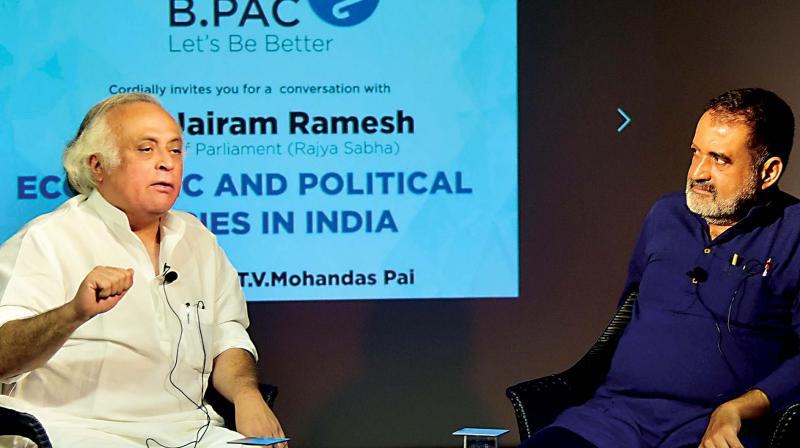In '90s, India's per capita income was 15percent higher than China's: Jairam Ramesh
As for India, Indian capitalists made socialism respectable through several scandals, like the Godhra scandal,\" remarked Mr. Ramesh.

Bengaluru: "The economic growth was 0.05 percent before Independence and eventually started growing after liberal policies impacted the industries," said Congress senior leader Jairam Ramesh on Saturday during a talk on "Political and Economic Policies in India", organised by the Bangalore Political Action Committee(B.PAC) and moderated by Manipal Global Education chairman Mohandas Pai.
"During the 1970s, when other economies were growing fast, India was stuck at 3.5 percent. An economy that was growing at 4.5 percent came crashing down to less than 3%. The recovery started only in the 1980s, and it really took off after 1991. By 2014-15, it was at 7.5 percent and now we are talking about this growth," he said.
"In the 1990s, India's per capita income was 15 per cent higher than China's. But today, China's per capita income is six times that of India's and my conclusion is that the gap was created in the post-90s period when the Chinese reformed more," he said.
"As for India, Indian capitalists made socialism respectable through several scandals, like the Godhra scandal," remarked Ramesh as the audience burst into laughter.
On the challenges he faced during his tenure as a Minister of Environment and Forest, Drinking Water and Sanitation in the UPA government, he said, "Economic and climate change was the challenge when I was handling the ministry and those were the issues that hit the headlines. Later when I took over as sanitation and water minister, providing public toilets and making villages open defecation free was one of the greatest challenges. However, we have organised several initiatives and the current government has taken it up in a larger scale."
He spoke about the decisions that went against the industry, giving the example of bauxite mining. That was because, he said, "I believed in systems growth to be balanced."
Answering questions from the audience, he said, "There are no serious threats to social and political fabric of the country."
On pollution and other related issues, he said, "Cities will face more challenges due to a large number of people leading to issues like increasing pollution. It is necessary to mitigate and act immediately."
On a positive note, he said, "India provides a stunning model of a functional multicultural, multi-religious society to the world.
The countries that manage diversity well are the ones that will succeed."

